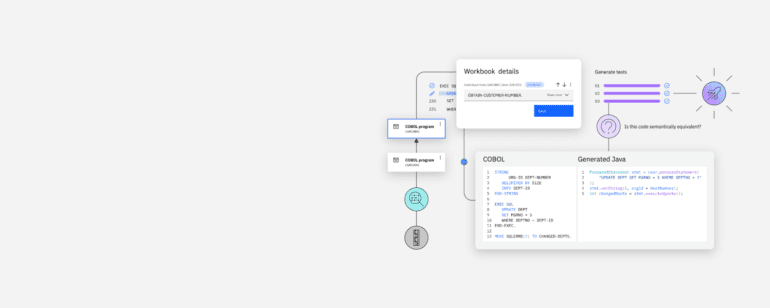TL;DR:
- IBM’s Watsonx Code Assistant employs generative AI to transform outdated COBOL code on mainframe systems into modern Java.
- COBOL, although aging, still powers 70% of global banking transactions and has around 800 billion lines of daily-use code.
- A shortage of COBOL developers and the complexity of modernization pose challenges to mainframe clients.
- Watsonx Code Assistant offers a solution by preserving the mainframe platform, expanding IBM’s client relationships, and boosting its consulting business.
- Data privacy is a key advantage for clients in sensitive industries.
- IBM’s AI strategy aims to enhance client productivity and efficiency.
- This AI tool helps clients modernize mission-critical applications, strengthening IBM’s mainframe business.
Main AI News:
Large language models designed for code generation have gained prominence in the past year, reshaping the landscape of programming. While they don’t supplant human programmers, they wield the power to significantly enhance productivity by tackling the drudgery of coding tasks.
International Business Machines (IBM) has been steadily unveiling its Watsonx artificial intelligence (AI) platform, designed to empower enterprise clients in training and deploying generative AI models, all while adhering to stringent data privacy and regulatory mandates. The latest addition to IBM’s AI arsenal, the Watsonx Code Assistant, targets specialized use cases with remarkable precision.
One such use case involves the metamorphosis of age-old code, running on IBM’s venerable mainframe systems, into contemporary programming languages. This seemingly mundane application of transformative technology holds immense promise for IBM, as it strives to maintain the relevance of its mainframe systems and cultivate additional revenue streams among its enterprise customer base.
From COBOL to Java COBOL, or Common Business Oriented Language, harkens back to 1959. While it may not feature prominently in the creation of new applications, given the plethora of modern programming languages at our disposal, COBOL still commands a significant presence in certain industries. Astonishingly, IBM estimates that approximately 70% of global banking transactions are executed on mainframe systems running COBOL. Another estimate pegs the total lines of COBOL code in daily use at a staggering 800 billion.
The conundrum arises from the diminishing knowledge base surrounding COBOL. It’s no longer a staple of instruction in U.S. universities, and even if it were, learning COBOL could be perceived as a career misstep. This leaves companies reliant on COBOL-powered workloads in a quandary. The process of recasting decades-old COBOL code necessitates scarce, specialized talent and poses a substantial risk to mission-critical systems. Over time, the pool of programmers capable of modernizing COBOL applications steadily shrinks.
Watsonx Code Assistant for Z, a specialized iteration of IBM’s code assistant, offers a solution. Leveraging generative AI, this tool comprehensively maps out a COBOL application and its interdependencies, disassembles it into modular components, and transforms these components into contemporary Java code. While validation testing support remains on the horizon, it is slated for inclusion in a future release.
A Multi-faceted Triumph IBM’s Watsonx Code Assistant for Z accomplishes several pivotal objectives. Firstly, it furnishes mainframe customers with a path to contemporize their applications while preserving the mainframe as a robust platform. Secondly, it extends IBM’s rapport with its mainframe clientele. Thirdly, it injects vitality into IBM’s consulting division. Collaborating closely with clients, IBM’s consulting arm identifies applications ripe for modernization and collaborates across the organization to craft bespoke solutions for clients with distinctive requirements.
Notably, data privacy emerges as a paramount concern, especially for COBOL-driven applications underpinning sensitive and mission-critical systems in the banking and financial services sector. By partnering with IBM and harnessing the Watsonx platform, clients can safeguard the security of their data.
An Enterprise-Centric AI Strategy Mirroring its hybrid cloud strategy, IBM’s AI strategy revolves around empowering clients to heighten productivity, enhance efficiency, and reduce costs. The prospect of manually transmuting legacy COBOL applications into modern languages entails substantial investments in terms of time, finances, and potential disruptions—an undertaking that many mainframe customers might find prohibitively daunting. With the advent of this AI tool, these clients are now presented with an alternative avenue to modernize their mission-critical applications.
IBM’s mainframe business stands resilient, yet the dearth of COBOL developers has emerged as a vexing challenge for clients. This innovative AI tool serves as a beacon of hope, ushering clients’ mainframe applications into the 21st century and fortifying IBM’s mainframe business in the process.
Conclusion:
IBM’s Watsonx Code Assistant addresses the pressing issue of modernizing COBOL-based mainframe applications. It not only safeguards the relevance of IBM’s mainframe systems but also fosters client relationships and drives growth in the consulting sector. This innovation aligns with IBM’s strategy to empower clients and reduce the complexity of legacy system transformation, making it a significant development in the market.

